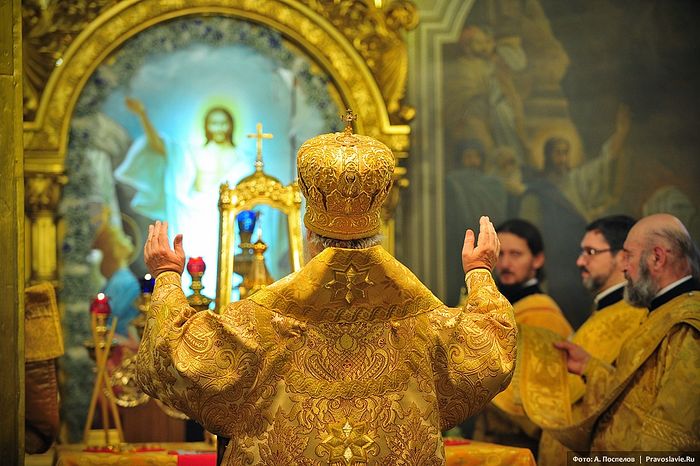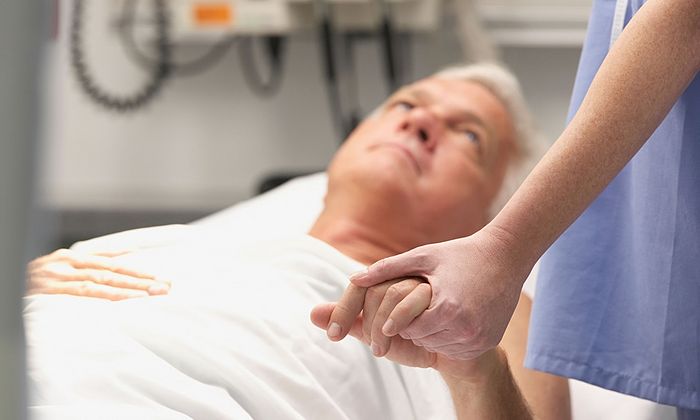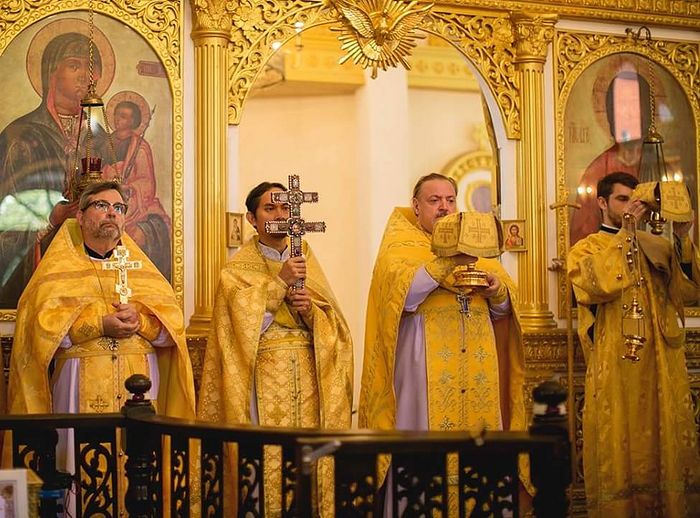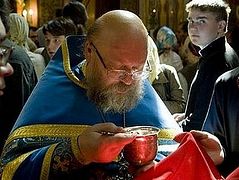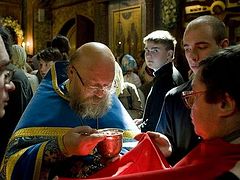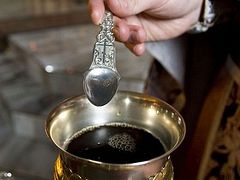I think that when we approach for Holy Communion is a thermometer of our faith. Once we said that the thermometer of our faith is prayer, and now I say that the thermometer is whether our heart leaps at the sight of Communion. Prayer is love for God, and Holy Communion is also love for the Lord, but it is also something much higher, incomparably higher; after all, through Holy Communion we receive divine power into ourselves.
They say, “May Holy Communion be to thee unto health!” Yes, of course—only we receive into ourselves not something magical, but the Lord Himself enters us. Our body becomes one with His Body, in our veins flows the Blood of Christ, our breath becomes His breath, and His breath becomes our breath. We become one with Him. The life of Christ becomes our life, and something absolutely astounding takes place.
In this minute we thirst for Communion of Christ, and this is the goal of Holy Liturgy. That is why it is served—so that we would partake. And those of us who do not partake, look at the communicants and rejoice over them and be zealous for them. And whoever does not experience zeal when others commune does not feel Holy Communion, he has no perception of Communion.
We need to be zealous for them in the good sense of the word, so that we would say, “Oh, I also want to labor ascetically and receive Communion! I also want to do what my spiritual father told me to do—to correct this inadequacy that prevents me from approaching Holy Communion, and then receive Communion the next time.” And if you see how others are communing but you remain indifferent, looking at your watch, saying, “What time is it? Oh, how long will this go on? When will it finally end?” it means that Holy Communion does not touch your soul.
When I was little, I liked to watch how people receive Communion. I looked at this scene and it seemed to me that people were walking up and as if receiving the sun into themselves. Yes, one and the same sun, and they all received it. It is the same with Holy Communion: The Lord entirely enters into us, and each receives not just some part of Him but the whole Christ, no matter how large or small the particle the priest gives us.
And if we could ask the Lord, “Lord, what is Your greatest wish connected with us? What do you want from us most of all?” if we could peek into the Lord’s heart in order see what is the greatest desire it conceals, then I think we would hear that the Lord wants to become one whole with us. I think that He would say to us:
“My child, what I want more than anything else is to unite with you. That is after all why I became Man, in order to become what you are. And for this I bequeathed to you the gift of Holy Communion, so that you would become what I am; so that you and I would become one whole.”
Look at what is written in the book of Revelation: Behold, I stand at the door, and knock: if any man hear my voice, and open the door, I will come in to him, and will sup with him, and he with me (Rev. 3:20). And Holy Communion, that is, the Supper, is union with the Lord. We wholly unite with Him and become as He is.
Once on Euboa a woman went to confession with elder Yakovos. She confessed to him everything except one serious sin, which she hid. The elder understood this but didn’t say anything to her. He prayed that God would enlighten her, and God truly did enlighten her with a miracle so that she would understand that she had been mistaken in hiding that sin.
Some time after that confession, she again went to the church where the elder served. The church was completely empty at that hour, and the woman saw that the altar was open, and on the holy table sat a very beautiful youth with a wondrously beautiful face. She was indignant and said to him, “What are you doing there? Sitting on the holy throne?! Well then get down from there! Aren’t you ashamed? A young man, and he’s gone and sat on the holy throne!” she went on in her indignation.
Then the young man turned to her and said very calmly, “And why didn’t you name that sin that you committed?” and he named that very sin.
She marveled and said to Him, “How did you know that I didn’t name that sin? How do you know me? Who are you?”
He said to her, “I am the One Whom you will receive into yourself tomorrow.”
He said it, and disappeared.
The Lord Himself had appeared to her and as if said, “I am the One Who will judge you. I am He, Who helped you in a certain matter,” but in fact He didn’t say anything to her, only spoke about Holy Communion. Christ’s thought is directed at this, it strives for this; He wants for us all to come to Communion, so that we would become real, and ready to receive Him into ourselves. “I am the One Whom you will receive into yourself tomorrow.”
This woman, as you might have guessed, dropped everything and ran to elder Yakovos in tears and told him what had happened. Then they started talking about it in the monastery, and thus the incident went into the book about Elder Yakovos.
Here is what one priest told me: He worked as an orderly in a hospital and even asked to be transferred to the floor with bedridden patients so that he could take care of them. He wanted to do this while he was still young, because he had read somewhere that if a person will wash those confined to their sickbed and clean up after them, change their clothes, etc., then if he touches their wounds he touches God Himself. If someone can touch a sick person without feeling any repulsion or squeamishness, then he touches God.
Thus, he asked to be shown this mercy, and his request was fulfilled, especially since the young nurses found it hard—and it really isn’t easy. It is easy to talk about it but not so easy to do it.
So one day he went to divine services, received Communion, and then returned to the hospital to wash his bedridden elderly, change their bedclothes and then go home. He entered the room of one grandpa who had open bedsores on his back. (I didn’t know what open sores were until this year at Pascha on Mt. Athos, where I saw them on one ailing elder. It is a terrible sight.)
“Can I ask you something my child? Did you go to church?”
“Yes, grandpa, I went and returned to wash you, so that you would be nice and clean.”
“I envy you—you went and received Communion… You did receive Communion, didn’t you?
“Yes!”
“I envy you. I would also like to be able to go and receive Communion…”
“Grandpa, don’t worry! Next time I’ll bring you a priest so that he would give you Communion.”
“Good, thank you!”
He washed him just has he did the other elderly who needed it. But with the first old man he cut his finger while cleaning his mouth, because there was a piece of plastic hanging from his teeth. He wiped his arm with cotton, and since he had just received Communion he put the cotton into his pocket to burn it later.
He returned to the first grandpa to make sure that everything was okay, and saw that he again needed cleaning. The old man said to him, “No problem, my child, don’t clean me! Come back tomorrow, leave me as is.”
“What are you saying, grandpa! I’ll wash you—what nonsense!”
He cleaned up after him, and when he turned him over taking him by the arm, he saw that it was bleeding. And the thought came to his head, “What will happen if I press my bleeding finger—after all, I received Communion today!—to the grandpa’s wound? What will happen? I have the Lord in me!”
And without saying anything he placed his hand on the wound, pressed it lightly and continued to wash him.
However the grandpa at that moment felt a rush of strength and said, “My child, did you wash me a second time?”
“Why?”
“I felt strength and feel such vigor in my soul!”
“Ah, grandpa, if you only knew what I did with you! But I’ll tell you another time why you feel that way. It’s something else.”
He had touched the sick man with his hand that was bleeding blood that carried Christ’s blood. And a miracle happened, allowed by the Lord.
Holy Communion cleanses; it does not transmit inflection, just as the Holy Spirit cleanses us. It’s as if you were to place something dirty in the sun, and it can be none the worse for it. To the contrary, it is cleansed of all defilement and filth.
Therefore statistics testify that clergymen are the longest-living people on earth. You rarely see a priest die young—only if God doesn’t allow it, they as a rule die in deep old age. They continually receive Communion, continually consume Holy Communion at oblations, and live to a hundred years; but this cannot be explained logically or scientifically. We priests cannot ask if anyone has AIDS, or if he has a sore in his mouth, but we commune everyone and then consume the Holy Communion.1 This proves that Holy Communion is truly the Sacrament of sacraments and a great mystery, which we don’t even properly value.
Elder Yakovos once said that he saw a drop of human blood in Holy Communion when he received Communion. And another time he saw a ray of light coming from the Holy Potir,2 and understood from this that those who were receiving had prepared themselves as they should.
St. Andrew of Crete, the author of the Great Canon of Repentance, as a child was unable to speak for a long time but was healed, and his tongue was loosed at Holy Liturgy, after he had received Communion.
St. John of Kronstadt was a great man, who worked many miracles through Holy Communion. He healed the sick; he gave them Holy Communion with such faith that when they received Christ they were healed. He had enormous faith, as did the faithful.
But we, unfortunately, resemble do you know what? We resemble little children playing with priceless diamonds without knowing what we are holding in our hands. If we would turn the benefit of Holy Liturgy and Holy Communion on ourselves then we would change our lives and our families.
One elder taught his spiritual children, “When you go to receive Communion, pray to God that He would give you the gift in that hour. When Holy Communion enters your lips, pray to God,”—he meant the spiritual gift. He especially counseled people to ask God for the gift of prayer, so that God would teach them to pray. And to another person he said, “Pray to God that He would take away your obstinacy, gluttony, and that you would acquire humility.” These are spiritual requests.
His acquaintance, who could not pray as he should, in the minute that he touched the Lord’s Body prayed about this, and his mind was opened. He understood in that moment what prayer is, and felt that he had been spiritually resurrected. From that time on, whenever he saw Holy Communion he remembered this gift and wept with awe.
Such are the gifts of Holy Communion, which I wish for us also to experience in our lives and feel them. There are people who live by Communion alone. One man, after receiving Communion with faith and piety, felt no hunger for several days. He felt as if he had been satiated with food, like the three apostles on Mt. Tabor when they said, “Lord, let us stay here” (cf. Matt. 17:4). You feel so good that you don’t feel hunger. This is that very feeling of Holy Communion.
But we do not prepare ourselves for Communion and therefore there is much that we don’t feel; we simply are not ready to experience it in that hour. When someone sits the evening before watching television and then goes in the morning to receive Communion, he can’t understand anything. And instead of saying, “I am not worthy, yet I communed,” says, “And now that I’ve communed, why doesn’t anything happen?” What can happen? And how can it happen if you aren’t ready? You simply can’t feel anything.
Some say, “Holy Liturgy burdens me.” But in order for something to burden you, you have to experience it first, so that it could then begin to burden you. But what did you experience? And could you ever experience the absolute to the absolute degree? But since Holy Liturgy is Christ, are you saying that Christ burdens you? Then you don’t know what you are doing; you don’t know what you are saying, and you have never felt Christ. And if you were to feel Him, He will not be a burden to you.
The angels never tire of hymning praise to God—that is their activity. And paradise will be an unbroken, unending Holy Liturgy. Holy Liturgy is powerful to arouse our souls to praise of God, to turn to heavenly things and emulate the angels about whom it is said that they ceaselessly praise and hymn God, and they never tire of this.
The Angels praise God with unchanging desire, vigor, liveliness, and exaltation, as if it were the first moment; and their exaltation only increases. Why? Because they always see something new in God. God reveals to them new sides to His holiness, new sides to His grandeur and light, He adds peace to their peace, love to their love, adoration to their adoration. The angels continually exalt, and when they express their adoration and joy to God, God shows them something new even before they rejoice, something yet more wonderful, and they rejoice even more; and this never ends.
This is what will take place in eternal life, about which people sometimes ask, “What will Holy Liturgy be like in paradise, how will we live in paradise, what will we be like there?” We will ceaselessly praise God there, because we will see something that we can never be too full of, for there will be no satiation or end. We will see there the Lord Himself and His love.
This happens also at Holy Liturgy, and every Holy Liturgy differs from another in some way. You perceive it in another way when your spouse is in the hospital—then you say another prayer, and the Gospel touches you in another way. A mother perceives it another way who lost her child a month ago, when she hears the Gospel reading about how the Lord resurrected the son of the widow of Nain (cf. Lk. 6:11–16). In that hour the Gospel text touches her in another way, because she experienced this and knows what it means to lose a child.
Someone who has just started a family and begins family life with Holy Liturgy receives it in one way, a schoolchild going to exams, in another way. It all depends upon our state. All of this speaks of how the Word of God is alive, and a dialogue takes place between God and our soul; but this depends greatly upon our preparedness.
One saint prayed thus: “O Lord, may our hearts be enlivened to hymn Thy praises, may they be awakened!”
One day a man came to Elder Paisios, who said to him, “My child, your soul is in a state of lethargy. It should wake up. So that we could talk and you would understand me, you first have to wake up. Make a spiritual rule for yourself that you will go to church regularly, as much as possible—if you can, three times a month, and if you can, every Sunday. That would be even better. Your mind will open little by little, your heart will fine peace, and then I will talk and you will understand me. But if I talk to you now you will not understand, because your soul is in a state of laziness, insensibility, and indifference and you will not percieve divine things even if I tell you about them.”
Another man who had many problems came and asked Elder Paisios, “Father, I have this and that problem. Tell me, what should I do?”
The elder asked him, “Do you go to Holy Liturgy?”
“I don’t”
“So, now go every Sunday.”
“Alright, and what will you tell me about my problem?” He wanted to change the subject.
“Do what I said and you will see. You will go to Holy Liturgy.”
“Yes, but I have those problems I told you about!”
“Do it, and you’ll see!”
He went home from the Holy Mountain a little upset, saying, “I travelled so far, and Elder Paisios only told me what I already know: Go to church! Well what is this? Did I have to go to Elder Paisios so that he could only tell me that? Well, what else is there to do, I’ll do as he says.”
He started going to church and his problems at home and at work gradually began to go away. This amazed him. A year and a half later he saw that much in his life was working out well, and he again went to the Holy Mountain. Then Elder Paisios asked him, “Do you go to church like I told you to do?”
“I go, father, and everything worked out for me. I want that you would tell me how it all happened.”
The elder said to him, “My child, when you go to church you make peace with God. And when you make peace with Him, don’t you understand that He gives you every good thing? Before coming to me you did not have a good relationship with God, and you resisted Him, were far from Him. But I told you what the root is to everything: If you make peace with God, everything else will be resolved, one thing after another. That is why your problems went away.”
Our salvation is very simple; it is close, right next door, and we don’t need to go anywhere. For this we need only one miracle: that the Lord would touch our souls, wake us up, and so that we would love Him and desire Him.
When at the Holy Liturgy we feel joy in our souls, a joy that is greater than any other joy, it means that the “dawn” has broken in our souls into another life: We begin to have a foretaste of what we will feel in eternity.
I pray to God that He would make us fleshly people, sunk in the vanity and falsity of this world, capable of loving the eternal, immutable, and imperishable.
In this way, any perplexity surrounding Holy Liturgy is resolved at the Liturgy itself…

